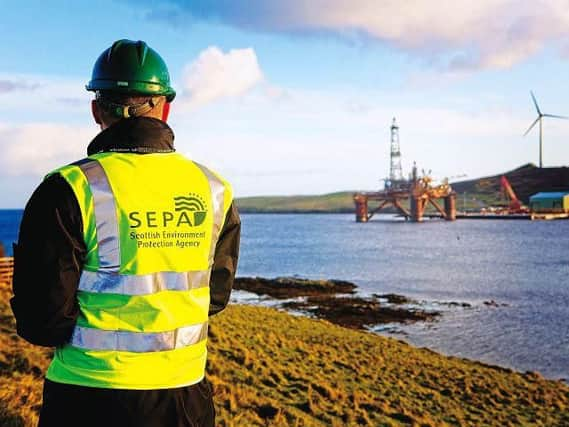Scotland driving world change, says SEPA


From climate change to the circular economy, Scotland is driving globally ambitious, internationally recognised policy with a purpose - it's policy that recognises the economic, as well as environmental, opportunity of a more sustainable Scotland.
Without natural resources we can neither meet our daily needs for life, nor create prosperity. However, the rate of resource use today considerably exceeds the planet’s regeneration capacity.
The most successful countries in the 21st century will be resource efficient, circular economies, which do not produce significant quantities of waste.
A circular economy keeps materials in use for as long as possible and extracts maximum value from them.
This great challenge is now reflected in SEPA’s statutory purpose directing us to protect and improve the environment, including the sustainable use of resources, in ways that as far as possible create social and economic success.
For us the circular economy is a game-changing opportunity to:
*manage resources within planetary limits;
*reduce the harms associated with waste management;
*create economic opportunities.
Collaborative working with sectors, regulated businesses and other organisations will enable innovative sustainable approaches to achieve both compliance and support businesses to go beyond compliance.
At SEPA, we’re helping Scottish businesses recognise the opportunities of sustainability and resource efficiency.
Not only can resource efficiency improve productivity and the bottom line for business, it can bring “end of pipe” environmental improvements and reduce our reliance on virgin raw materials.
Today’s regulation must put resource efficiency at the heart of its work.
We already work with Scotland’s largest industrial units on resource efficiency (waste, raw materials, water, energy and heat) and have a strong track record of facilitating the use of secondary materials through “end of waste” criteria and other approaches.
SEPA’s sector engagement approach and sustainable growth agreements – partnerships with leading businesses and third sector organisations – provide an opportunity for a renewed focus on waste and resources across a range of industries.
We will work with industry to identify innovative opportunities to displace virgin raw materials with secondary materials (like recycled glass in whisky bottles) and pilot new technologies and techniques.
This will include using all our regulatory influences and promoting support services from partners.
We will champion sustainable resource use across industries and supply chains and help them take practical actions to improve environmental performance in ways that deliver business success.
We will help showcase and celebrate that success also. Each year, the SEPA and Scottish Government-led VIBES – Scottish Environment Business Awards – showcase the best of Scotland’s sustainable businesses.
They showcase companies like Jaw Brew which won the VIBES 2017 Circular Economy Award. Among the Paisley-based craft brewer’s products is Hardtack which is produced from unsold morning rolls provided by Aulds the Bakers.
At SEPA, we’ll also back legitimate businesses by getting tough on waste crime, which impacts not only communities, but companies seeking to do the right thing.
While recent years have seen a significant focus by consumers, households, communities and businesses on reuse and recycling, Scotland’s recycling and waste sector has long held an unenviable record of falling foul of Scotland’s environment watchdog.
The waste regime had the highest number of cases referred to the Crown
Office and Procurator Fiscal Services (42 per cent), final warning letters (46 per cent) and statutory notices served (48 per cent), as well as the most convictions (38 per cent) of regulated sectors secured in 2016- 2017.
Compliance is non-negotiable, with the SEPA’s dedicated waste crime and intelligence teams securing a series of high-
profile outcomes for local communities.
These included the clearing of 1,500 tonnes of illegally deposited waste and chemicals from a site in Newton Mearns and revoking the license of GBS Recycling in Coatbridge which was found to be stockpiling waste on site beyond the time limits allowed, causing significant fly and odour issues for neighbours.
In addition to targeted intelligence and enforcement campaigns to crack down on waste crime, SEPA is working with businesses investing in high-tech recycling solutions that drive positive environmental outcomes.
This includes the £27 million materials recycling facility, opened by Suez and
Aberdeen City Council last year.
As a result of SEPA’s firm focus, overall compliance within the sector has risen to 90.35 per cent in 2016, from 72.48 per cent in 2009.
So whether it is supporting Scotland’s sustainable businesses by focusing on waste, raw materials, water, energy and heat, or getting tough on waste crime, SEPA is working hard to help realise the environmental and economic opportunities of a circular economy.
Find out more at https://www.sepa.org.uk/